Birmingham Landscape Design Tips
Dos and don’ts for landscaping in Northern Alabama
- 1
- 2
- 3
- 4
Nestled amongst the foothills of the Appalachian Mountains, Birmingham boasts more green space per person than any other U.S. city. Residents of the city can enjoy numerous outdoor activities at places such as Vulcan Park and Oak Mountain State Park. However, you don’t have to visit a public park to enjoy the outdoors. With a good design, proper materials and carefully selected plants you can have an outdoor retreat all your own.
For over 20 years, The Nelson Team, based in the suburb of Leeds, has been helping homeowners in the Birmingham area transform their outdoor spaces. Below you will find a collection of dos and don’ts from Jeff Hiatt, the irrigation technician for The Nelson Team.
Dos:
- Do make a plan.
Decide early on what your long and short range plans are for your total landscape. Always begin by thinking about what hardscapes you intend to install. Do you want to expand your patio? Do you need retaining walls? These needs must be addressed before thinking about what to plant. - Do use plants that are native to our area.
Plants native to the Birmingham area will thrive in our weather and soil conditions. Some of my favorites are Sweetspire, Bottlebrush, native azaleas (deciduous), Oakleaf Hydrangea and dwarf Pawpaw. Trees that are common are oaks, maples, Southern Magnolia, Sweet Bay Magnolia, crape myrtle, and dogwoods. Live oaks do well in the southern half of Alabama due to sandier soils. - Do amend your soil.
To allow for healthier growth, the soil in your planting beds and holes for trees and larger shrubs should be amended. Northern Alabama soil is mostly red clay and there are many areas that are extremely rocky. We have an abundance of limestone formations in the northern part of the state. The southern half of the state becomes more sandy and loamy as you get closer to coast. - Do plan for proper irrigation.
Even though we average 48 inches of rainfall per year, we have scorching hot summers and tend to have mini droughts that will zap a landscape quickly. Dragging hoses across your property is not a fun chore and never provides proper watering. Irrigation systems can be designed to cover all of your different plants, grasses and trees with the right amount of water needed. - Do create a rain garden.
As just mentioned, our area is blessed with a good deal of rainfall. Take advantage of this rain by installing a rain garden planted with native plants. With a rain garden, you’ll get beautiful plants with little effort all while helping the environment. Rain gardens are shallow depressions that allow runoff from downspouts or paved areas to percolate through the soil and reenter the supply of groundwater. In this way they help keep pollutants from being washed into nearby lakes, streams or even the ocean.
Don’ts:
- Don't over plant.
Most people in the Birmingham area want their landscapes to look established right from the start. This often leads to people buying large plants and planting them in tight groupings. However, when planting a new landscape, plants should be spaced according to their mature size. Otherwise you will be ripping plants out in five years due to overcrowding. - Don't commit crape murder.
Many Alabama homeowners think that heavy pruning of crape myrtles in the winter will force more blooms - this is a myth. You wouldn’t cut the top out of your maple or oak tree, so why do this to a crape myrtle? Crape myrtles are a tree and need to be treated like one. This type of aggressive pruning will eventually kill the tree. - Don't use every plant you love.
All too often we see DIY landscapes that have fallen victim to the one-of-everything approach. When browsing around at the local nursery, keep in mind that some plants don't look right next to each other. For instance you would not put a palm tree in the middle of your English garden. - Don't use plastic weed block.
Plastic causes the soil to become sour and cuts off oxygen to the roots of plants. Even so called weed block fabrics do more harm than good. The best remedy is to keep a healthy thickness of mulch in landscape beds. This will not eliminate weeds but will discourage most weeds from germinating. Mulch also makes it easier to pull the ones that do grow. Remember that all gardens need your love and tending in order to flourish. - Don't plant vines next to structures.
Climbing vines are incredibly popular for creating Southern charm on the exterior of buildings and homes. No matter how charming they may look, think twice before planting them near your home. To keep them from causing damage, you will need to spend time pruning them off your walls every year. Climbing vines are much better suited for trellises and pergolas.
The Nelson Team, Inc.
Leeds, AL



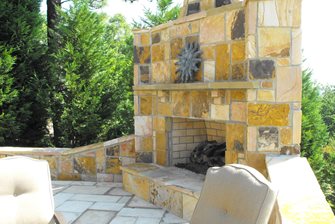
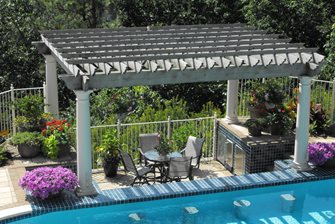
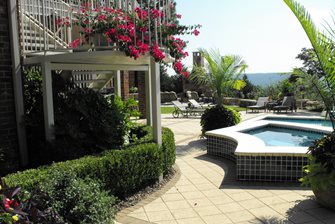
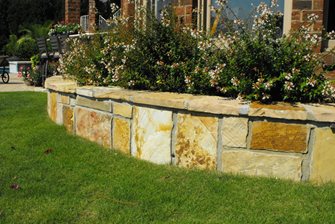
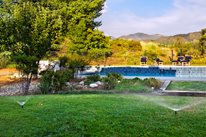 Sprinkler Systems
Sprinkler Systems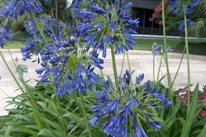 Landscape Plants
Landscape Plants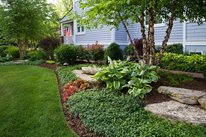 Maintaining Landscape Beds
Maintaining Landscape Beds

